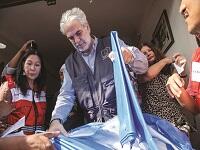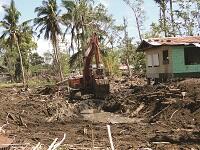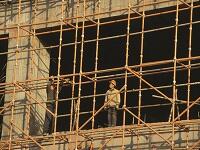News Brief
United Nations Secretary-General Ban Kimoon announced the first High-Level Panel on Women’s Economic Empowerment. Its purpose is to provide leadership and mobilize concrete actions aimed at closing economic gender gaps that persist around the world. Announcing the panel, Ban said the empowerment of the world’s women ‘is a global imperative’.
‘Yet despite important progress in promoting gender equality, there remains an urgent need to address structural barriers to women’s economic empowerment and full inclusion in economic activity,’ the Secretary-General said. ‘If the world is to achieve the Sustainable Development Goals we need a quantum leap in women’s economic empowerment.’ The panel will provide recommendations for the implementation of the 2030 Agenda for Sustainable Development to improve economic outcomes for women and promote women’s leadership in driving sustainable and inclusive, environmentally sensitive economic growth. The panel is backed by the United Kingdom, the World Bank Group and UN Women, with Luis Guillermo Solis, the president of Costa Rica, and IKEA Switzerland CEO Simona Scarpaleggia serving as panel cochairs. They will be joined by a diverse range of gender and equality actors, economics experts, academics, trade union leaders and business and government representatives from all regions.
European Commission announces biggest-ever aid budgetThe European Commission adopted its humanitarian aid budget for 2016. With nearly €1.1 billion(US$1.2 billion) as an initial allocation, it is the highest European Union (EU) humanitarian budget to date. The move comes as global humanitarian needs are increasing as a result of armed conflict, the increasing impact of natural disasters, climate change and the economic crisis. ‘Next year we’ll have a record budget due to tragically high levels of needs,’ said Christos Stylianides, the European Commissioner for Humanitarian Aid and Crisis Management.
‘The EU will continue to play its role to address the needs of the most vulnerable and can be proud to remain among the leading global donors of humanitarian assistance in 2016’ The budget will address the external dimension of the refugee crises in Syria, Lebanon, Jordan, Turkey, the Western Balkans and Iraq. It will also assist people affected by other conflicts, such as in South Sudan and Ukraine and address the needs of communities affected by complex and recurring crises in the Sahel region and Lake Chad Basin. The funding will also help vulnerable people caught up in many of the world’s ‘forgotten crises’, including in Colombia, Myanmar and Afghanistan. The Commission is set to increase in 2016 its humanitarian funding for education in emergencies from 1% to 4% of the EU’s overall humanitarian budget, meeting the UN target.
UN launches aid operations to assist FijiThe United Nations has begun work to provide international assistance to Fiji, which was hit by a powerful tropical cyclone that left at least 28 people dead and some 14,000 people sheltering in evacuation centres. The UN Pacific Humanitarian Team and new partners arriving in Fiji are being asked to work through Fiji’s existing operational structure to allow for a coordinated and effective response, according to the UN Office for the Coordination of Humanitarian Affairs (OCHA).
It has been agreed that OCHA will be the conduit for communications between Fiji’s National Disaster Management Office and international humanitarian partners regarding offers of assistance. Relief supplies and assessment teams have now arrived on Koro Island, where whole villages have been destroyed, OCHA’s situation report says. The International Trade Centre (ITC) is also working with its partners to help rebuild the enterprises of beneficiaries that were destroyed or damaged. ITC Executive Director Arancha González will pay a visit to Fiji in early April for talks with the Government and other partners on how to advance the rebuilding.
OECD report calls for stronger measures to boost growthPolicymakers must deploy broad-based reform plans that incorporate monetary, fiscal and structural policies to stimulate persistently weak demand, re-launch productivity growth, create jobs and build a more inclusive global economy. So says the annual Organisation for Economic Co-operation and Development (OECD) Going for Growth report. This year’s edition shows that a slowdown in the pace of reforms first observed in the 2013-2014 period continued during 2015, notably in advanced economies and also in emerging ones. New reforms are aimed at improving educational outcomes and raising the labour force participation of women. Still, not enough is being done to boost innovation or streamline product and labour market regulation, which are critical aspects of today’s productivity and equity challenges.
‘The worrying slowdown in the global economy calls out for an urgent and comprehensive policy response, drawing on all the monetary, fiscal and structural policy levers at governments’ disposal,’ OECD Secretary-General Angel Gurría said. The 2016 report makes the case for prioritizing growth-enhancing measures to best support demand in the short term, combining structural policies targeted toward regulatory reform with investment in public infrastructure. ‘Today’s exceptionally low interest rates improve governments’ fiscal space, affording a unique opportunity to make investments in infrastructure that will boost demand, stoke growth and actually improve public finances,’ Gurría said.
UN report finds migrants play critical role in Asia-Pacific developmentMigrants from countries across Asia and the Pacific play a key role by helping to drive economic growth in their countries of destination while also supporting families in their countries of origin. However, the benefits of migration remain under-acknowledged, a new United Nations report has found. Asia-Pacific Migration Report 2015: Migrants’ Contributions to Development, draws on evidence gathered from across the region. It found that more than 95 million people from countries in the Asia-Pacific region live outside their countries of birth and that the region hosts more than 59 million migrants. The majority of those migrants are temporary migrant workers.
The Asia-Pacific region also hosts more than 5.5 million refugees and three of the main refugee-hosting countries in the world are in the region, according to the report. Among its conclusions is that many migrant workers benefit from their migration while contributing to the development of their home countries through their work and the remittances they send home. Migrants also face hardships and abuse, so action needs to be taken to maximize the benefits by ensuring that migration is orderly, safe, regular and responsible, the report found. The study also provides guidance on the steps that countries, regional organizations, civil society actors and others can take to improve positive impacts, notably through securing the rights of migrants and ensuring their access to social protection and decent work.
Gender: the wide divide in workInequality between women and men persists across a wide spectrum of the global labour market. This is despite major progress in education that is not yet reflected in employment wins for women. This is the thrust of a new International Labour Organization report entitled Women at Work: Trends 2016, released just ahead of International Women’s Day, 8 March. The employment gender gap has narrowed by only a fraction of a percentage point (0.6) over the past twenty years with an employment-to-population ratio of 46% for women, but almost 72% in men.
Examining data for up to 178 countries, the report concludes that women continue to work longer hours per day than men in high and lower income countries. On average, women carry out at least two and a half times more unpaid and care work than men. This limits their ability to have more paid work. Employed women also, when combining paid and unpaid labour, work longer hours in total. For a range of reasons, working women still take home on average 77% of what men make, estimates the ILO. At the current rate of progress, it will take more than 70 years to close the gender wage gap.









